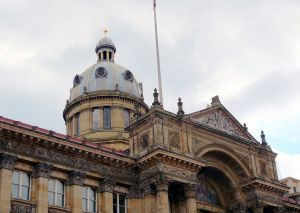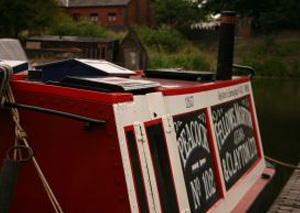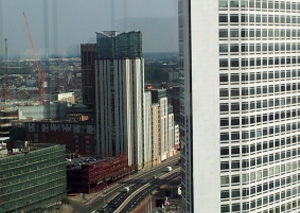Sell my car in Birmingham

Birmingham, or Brum as the locals call it, is the second largest city in Britain next to London. Located in the West Midlands, the city is conveniently surrounded by many motorways, including the Spaghetti Junction of the Gravelly Hill Interchange. This increases the frequency of people entering the city, especially now that it is making a radical change from a war-torn area into a great 21st-century shopping and cultural destination.
If you're wondering, "How can I sell my car in Birmingham," you don't have to worry as we're here to help you get the best price quickly. With us, you don't have to waste money and time selling your car.

Besides, who wouldn't want to own a car in Birmingham? Although pedestrian zones abound in the city and the one-way systems tend to be unintuitive, a vehicle is still a feasible way of exploring Birmingham and its neighbouring areas. The Birmingham City Council provides a map of car parks in the city centre to guide a motorist on where he can legally leave his vehicle when visiting places.
There are so many areas to explore in Birmingham and it's a waste of time if you'll just walk around. Having a vehicle will easily take you to a lot of places quickly, including museums, art galleries, nature parks and botanical gardens, and religious buildings reflecting the city's diverse population. The city also boasts of the most popular events and clubs in Britain. Birmingham has a rich culture and technological innovations etched in its history.
From a Remote Marginal Area to a Flourishing Urban Centre
Modern Birmingham was once located in the densely wooded Forest of Arden and was rarely inhabited. Stone Age artefacts revealed that early human activities in the area would be as far as 10,000 years ago but basically for overnight hunting and seasonal settlements. There were also evidences of substantial but quick increase of population in the area from 17000 BC to 1000 BC perhaps due to immigration or conflict in the neighbouring areas.
In the 6th or early 7th century, Birmingham was the main settlement of an Anglian tribal group of the Beormingas during the Anglo-Saxon area. In fact, Birmingham's name is based from the Old English term that means "home of the Beormingas." By 1086, the area is among the least populated and poorest in Warwickshire, which Birmingham used to be a part of.
It was in the Middle Ages, specifically in 1166, when Birmingham began its path to becoming a significant commercial centre after the Lord of the Manor Peter de Bermingham had a contract to hold a market at his castle. It was then followed with the creation of a market town and administrative division in his manor, which was around the Bull Ring, establishing Birmingham as the main commercial centre for the Birmingham Plateau. By 1327, it became the third biggest town in Warwickshire and a flourishing urban centre populated by craftsmen and merchants.
Birmingham’s massive growth and transition began when the main governing institutions of the medieval period collapsed from 1536 to 1547. Beginning 1538, manufacturing of iron goods was essential to the town's economy and Birmingham became a centre of iron merchants. By the 1600's, the town created a commercial hub of a wide stretch of forge and furnace network, allowing its metalworkers to cater to a wider market and diversify to a broad range of specialisation.
After the medieval institutions collapsed, Birmingham experienced an extraordinarily high degree of economic and social freedom, and during the English Civil War from 1642 to 1651, new social structures were developed. Social relationships changed from the high regard and strict paternalism in feudal societies to the practical commercial networking. Political thoughts also constantly changed in Birmingham from 1643 to 1660s.
By 1700, the town's population soared, making it the fifth biggest in Wales and England. And during the 18th century, the tradition of collaboration and free-thinking in Birmingham led to the so-called Midlands Enlightenment. It was a cultural phenomenon that transformed the town into a centre of artistic, musical and literary masterpieces. Birmingham is also home to influential people in the fields of scientific and philosophical ideas. These individuals collaborated with the town's leading manufacturers, contributing to the Scientific and Industrial Revolutions.
Great Minds during the Industrial Revolution

Unlike the industrial scene of unskilled, low-paid workforce in other British towns, Birmingham's industrial revolution was founded on the creativity and skills of highly paid workers with diverse speciality. With the demand for capital to meet business expansion requirements, Birmingham also became a financial capital with international networks. This led to a variety of inventions including the roller spinning machine by Lewis Paul and John Wyatt in 1732 that ushered the creation of the mechanised cotton industry.
From 1760 and 1850, the people in Birmingham had more than 300% of the number of patents registered compared to any other British city or town. The most notable is the industrial steam engine invented by Matthew Boulton and James Watt that was the key to productivity improvements on a worldwide scale.
Continued Growth Until After WWII
Population growth, technological innovations and political prominence continued throughout the years in Birmingham until the 1970s. Inventions include the postal stamp and the man-made plastic. Even when the town suffered during World War II, innovation still thrived. It was where ideas for the construction of a practical nuclear weapon and for the cavity magnetron (essential for radars and microwave ovens) were born.
But Birmingham's prosperity declined years after WWII when the Central Government restricted the town's growth by moving people and businesses to the non-developing parts of Northern England, Scotland and Wales.
Modern Restorations
With a rich cultural, technological and political history, isn't Birmingham a great place to visit as a tourist? It's even greater to live there. The city is seeing redevelopment and transformations especially in The Mailbox, Brindleyplace and other old industrial areas. Old canals, streets and buildings have been restored, making the city an interesting place to be explored and take up residence. So when you're planning to sell a car in Birmingham, you'll definitely have a market.
We will buy any car: